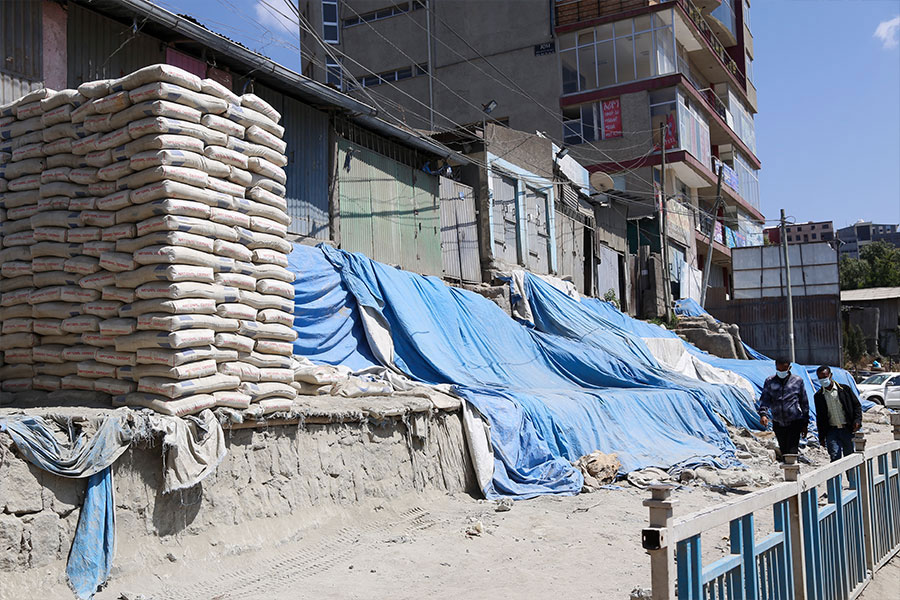
Commentaries | Feb 24,2024
Mar 13 , 2021.
It was a rare moment of excitement last Sunday when an Ethiopian Airlines plane alighted at Bole International Airport to an expectant crowd of public officials, diplomats and media personnel. The mood was celebratory as the plane’s cargo doors opened and boxes carrying 2.2 million doses of AstraZeneca vaccines were craned down to the crowd.
Lia Tadesse, whose appointment to the head of the Ministry of Health coincided with the first reported case of the Novel Coronavirus (COVID-19) in Ethiopia, made a speech before the media. The congratulations began to pour in almost immediately. It was the first wave of arrivals destined for Ethiopia, and the occasion trumpeted was a triumph of multilateralism and the fruits of the COVID-19 Vaccines Global Access (COVAX) initiative. Even Birgitte Markussen, head of the EU delegation to the African Union, expressed positive sentiments as the beginning of COVAX facilitated vaccines to 19 African countries over that past week.
No doubt, for a country with around 170,000 reported cases, this was a positive development.
At the Millennium COVID-19 Medical Centre, a new oxygen production plant on top of doubled production capacity by manufacturers over the past year was also encouraging. This is good news.
But considering the state of the pandemic, the enthusiasm is misplaced. Infection rates have been rising for a while, going into the double digits. A fifth of the 7,819 tested were found to have the virus last Thursday. Patients under critical care have also risen significantly, coming to over 400 for much of March 2021. It has been a while now as health professionals have been vocal about the lack of hospital beds, ventilators and respirators for COVID-19 patients.
Sudden upticks in COVID-19 cases are expected; experiences from other countries testify to this. Pandemics are known to have several waves before they pass through the population. In the Coronavirus case, most countries have gone through two or three lockdowns as a response to such waves.
This is inevitable unless herd immunity is reached naturally, which would be devastating given the pandemic’s relatively high mortality rate. If not that, it could be reached through vaccines that have been developed in record time due to modern science. For many a wealthy nation, able to bid competitively for patent-protected vaccines, this is good news.
Countries such as Ethiopia, which are too poor to afford vaccines until rich countries finish inoculating most of their populations or unable to develop their own, are not as lucky. As diplomats claimed, the COVAX facilitated doses finally reaching underdeveloped countries are encouraging, but only to a point. For one thing, and in most cases, every person needs two doses administered at different times to be considered vaccinated. With a population of over 100 million, what the Health Ministry enthusiastically received is a drop in the bucket.
The Health Ministry plans to reach just a fifth of the population by the end of the year. It is not anywhere close to achieving herd immunity, even with the caveat that Ethiopia’s population is largely young and not as susceptible to COVID-19. It is not yet known how many people would need to be vaccinated to reach herd immunity. There will be major variation among communities as well. But for viral infections such as measles and polio, it is 95pc and 80pc, according to the World Health Organisation (WHO). By such estimates, the country may not reach herd immunity for years. The virus may well continue to be a drain on healthcare infrastructure and resources, including medical practitioners.
Robbed of the advances of science because of a lack of resources to fight off the pandemic, the government has no choice but to stick to the more traditional means of limiting its spread. This is adhering to social distancing rules and hygiene promotion.
There is a big obstacle to this - public apathy.
At the outset, public officials had widespread paranoia a worldwide pandemic was bound to create going for them. Gradually, it began to dawn on many that the Coronavirus would not devastate African countries, with their weak health systems, as initially feared. This was followed by the expiration of partial lockdowns, which led to relaxed attitudes toward the virus. Combined with a dire political crisis and a precipitous economic slowdown, the public basically put the pandemic on the back-burner and, seemingly, even public officials.
It is reasonable to worry that the announcement of a vaccine rollout, beginning on March 13, 2021, may give the population a false sense of security against the virus. A feeling of optimism is not unwarranted for a country strained by war and a severe slowdown in economic activity, but it will further exasperate the situation when misplaced.
Policy options are limited. Additional lockdowns are unlikely. Gross domestic product (GDP) is already at its lowest in over a decade, at two percent, according to the International Monetary Fund’s (IMF) bullish estimates. Lockdowns that restrict business activities, especially in the service sectors, can lead to even greater headaches than can be created by the pandemic. This includes further falls in unemployment, food insecurity, and the budget deficit, all of which have been strained by half a decade of political instability.
With narrowed policy options, the government should enforce social distancing rules and hygiene promotion. Congestion has once again been normalised, with rallies and concerts taking place across the country with little pretension to following social distancing. The public media itself has trumpeted rallies across the country. Public consultations and events are a daily event now, with officials seen to be wearing masks and keeping the distance between one another only haphazardly.
In concert with other developing countries, the government can push for sharing of vaccines from the pie rich countries have appropriated for themselves. But as that effort, and the debate around the ethics of developed countries sharing vaccines before their populations reach herd immunity, continues, the traditional rules will have to do. At the moment, this should be campaigning for awareness and enforcement of rules to keep up with ascendant public apathy.
PUBLISHED ON
Mar 13,2021 [ VOL
21 , NO
1089]

Commentaries | Feb 24,2024

Radar | Apr 17,2020

Commentaries | Aug 06,2022

Featured | Apr 26,2019

Fortune News | May 04,2024

Commentaries | Jan 29,2022

View From Arada | Apr 09,2022


Fortune News | Nov 13,2021

Fortune News | Dec 28,2019

My Opinion | 131819 Views | Aug 14,2021

My Opinion | 128203 Views | Aug 21,2021

My Opinion | 126147 Views | Sep 10,2021

My Opinion | 123767 Views | Aug 07,2021

Dec 22 , 2024 . By TIZITA SHEWAFERAW
Charged with transforming colossal state-owned enterprises into modern and competitiv...

Aug 18 , 2024 . By AKSAH ITALO
Although predictable Yonas Zerihun's job in the ride-hailing service is not immune to...

Jul 28 , 2024 . By TIZITA SHEWAFERAW
Unhabitual, perhaps too many, Samuel Gebreyohannes, 38, used to occasionally enjoy a couple of beers at breakfast. However, he recently swit...

Jul 13 , 2024 . By AKSAH ITALO
Investors who rely on tractors, trucks, and field vehicles for commuting, transporting commodities, and f...

Jul 6 , 2025 . By BEZAWIT HULUAGER
The federal legislature gave Prime Minister Abiy Ahmed (PhD) what he wanted: a 1.9 tr...

Jul 6 , 2025 . By YITBAREK GETACHEW
In a city rising skyward at breakneck speed, a reckoning has arrived. Authorities in...

Jul 6 , 2025 . By NAHOM AYELE
A landmark directive from the Ministry of Finance signals a paradigm shift in the cou...

Jul 6 , 2025 . By NAHOM AYELE
Awash Bank has announced plans to establish a dedicated investment banking subsidiary...